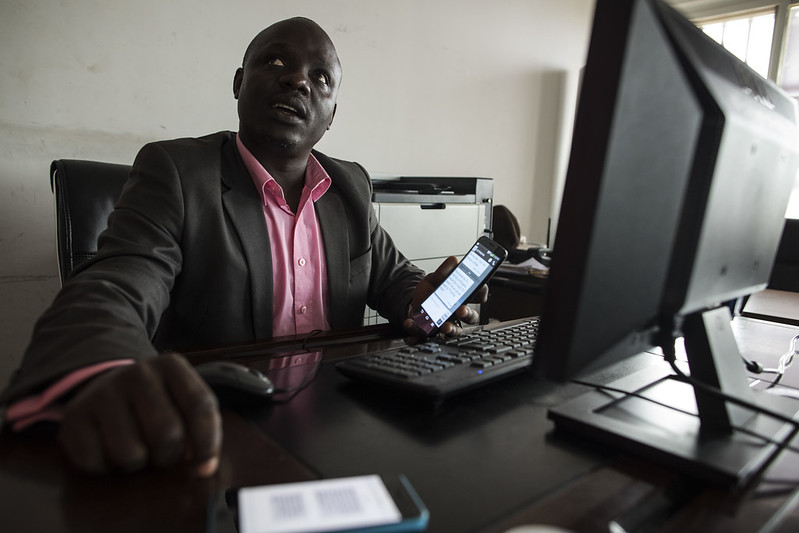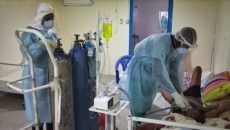BUCHANAN, Grand Bassa – Amid a health pandemic that has restricted movements and face-to-face interactions, many professionals across Liberia, including health workers, journalists, and educators, are reporting increased use of technology to do their work.
When the government ordered all but essential businesses and government offices to be closed and started implementing curfews that began at 3:00 p.m., then 6:00 p.m., before switching to 9:00 p.m. and back to 6:00 p.m., this meant that professionals had to find ways to do their work that did not involve interacting in person.
At the national Incident Management System, which monitors the pandemic on a day-to-day basis and makes reports about the nation’s performance, working virtually has been important.
One sign of this was the Ministry of Health, the Ministry of Foreign Affairs, and the National Public Health Institute of Liberia receiving medical supplies such as personal protective equipment and facemasks from China through a virtual presentation.
For the national risk communication team, technology has been playing a pivotal role in the fight against COVID-19. The co-chairman on media for the team, Hassan Kiawu, told The Bush Chicken via phone that most meetings are now held via a video conferencing platform, and information is disseminated to the public through social media and community radio stations.
“Since the lockdown, people have not been able to meet, because, first of all, the social distancing and wearing of masks have proven to reduce the infectious rate of COVID-19 by 50 percent,” he said.
“And because there was this fear that we were closer to each other and the number was climbing up, so at the Incident Management System, it was decided that people should use technology – a software application called Zoom that allows multiple people from any location in the world to do video or audio conferencing as well as media training and conferences.”
Kiawu said the only difference he has noticed is that “you can see the person, but you can’t touch them.” He noted that various social media platforms have been especially helpful in getting key messages out to the public.
“WhatsApp, Instagram, Messenger, Facebook, LinkedIn, and Twitter are helping to disseminate information,” he said. “If we did not have these social media platforms, then people would have remained hungry for information because they wouldn’t have any way of receiving information except through the radio. But now, at the comfort of your home, you can have a meeting, video conference, and send information, read an online newspaper, and not just wait for [the] radio station for news.”
The National Public Health Institute sends out a daily dashboard on Twitter and Facebook that updates the public on the number of new cases, deaths, recoveries, and other key information about the nation’s COVID-19 response.

The National Public Health Institute of Liberia’s dashboard regularly attracts 50-70 likes and shares, unusual for the Facebook page of a government agency that’s not the Executive Mansion.
Kiawu added that over 20 community radio stations across the country are regularly conducting simultaneous broadcasts of the COVID-19 regular updates. Excerpts are sent through emails and even Facebook messenger chatrooms and WhatsApp groups to stations that are not able to get ELBC Radio’s signals.
“So, technology has actually helped greatly to narrow the gap to connect with people through online with social media. While it is true that people are locked down, they are not moving; we are using technology to reach out to them so that they can get the message.”
Kiawu also noticed that many places of worship are adapting to ensure that their members can continue worshipping: “We also have learning by radio, going to church by radio. People sit home and learn through the internet and by radio, some viewing preaching by mean of social media, even the Muslim as well. We are using technology to fight the pandemic.”
The pandemic pushed many churches to speed up their adoption of technology. As it became clear that the health crisis would last longer than just a few weeks, churches that had never done live broadcasts before began to adopt those practices, allowing their members to worship on Facebook. Those that had already been doing so enhanced their online experience, as now most of their members were expected to use that platform.
Journalists, who have generally long been ahead of the curve in terms of the use of technology, are also going further. At the beginning of the pandemic, the Female Journalists Association of Liberia trained over 40 journalists in gender-sensitive reporting in anticipation that COVID-19, like most crises, would exacerbate gender disparities and increase sexual and gender-based violence.
The head of the association, Siatta Scott- Johnson, said using Zoom allowed the journalists from radio, television, newspapers, and online media platforms to gather in a three-day forum without posing health threats to one another.
At Radio Kintomah in Voinjama, Lofa, manager Tokpa Tarnue said the role of technology in the fight against COVID-19 cannot be overemphasized.
“Technology has been a great help to the work we do – not being able to move as usual, there are people sometimes you want to talk to, for instance, health authorities, because of the pandemic,” he said.
Tarnue said at this time, the station wants to limit the number of persons entering the studio. Phone interviews, therefore, have become essential.
“Because they are coming not to our studio, we call them through WhatsApp, phone, and [Facebook] Messenger to sensitize the people,” he added.

Tokpa Tarnue conducting a phone in talk-show in Voinjama. Photo: Tokpa Tarnue
He noted that health authorities frequently email the station with messages and jingles to educate the citizens in their local languages.
“Social media has been very helpful in the fight against the virus,” he said. “There is no way in this pandemic that I will come from Voinjama and go to Monrovia to get updates. No!”
Of particular usefulness, he said, was the World Health Organization’s and the National Public Health Institute’s Facebook pages.
“The only thing we need to do is to verify the information. Not everything you see, you have to run with immediately, or else you will mislead your audience,” he added.
Tarnue believed that regular COVID-19 updates from health authorities through phone interviews on the local stations and social media are helping to convert people who were once in denial that the virus was not real.
“Because the people trust the community radios and started implementing these protocols, it took long before even Lofa County could get a case,” he surmised. “It is because of those messages played on the stations and social media platforms. Now that it has happened, we have four cases. How can we remain at four instead of going beyond? We are making use of technology to continuously educate our people.”
In Grand Bassa, community radio stations are also doing the same to educate the public on the dangers of COVID-19. When the government announced the state of emergency and the resulting measures, stations in Grand Bassa relayed those messages to the public.
Radio Gbehzohn announced the closure of their studio to the public, only taking in guests through phone and social media interviews. Major talk shows such as “Good Morning Bassa” and “Gbehzohn Basket” no longer allow guests in the studio.
Buchanan’s Magic FM did not close its doors to the public, but the station’s management provided free airtime to religious leaders to preach while churches and mosques were closed.

King Browne, a reporter at Magic FM, uses a computer. Photo: Sampson David
On the education front, the closure of schools has also brought the use of technology to the forefront. The Bush Chicken previously reported on the Ministry of Education’s collaboration with Rising Academy Network and the Youth Movement for Collective Action to launch a “Teaching by Radio” program. The program ran on nine radio stations in Montserrado and other community radio stations throughout the country.
Telecoms giant Orange has also provided free access to textbooks, books, a dictionary, tutorial videos, and encyclopedias. The platform includes Khan Academy, which creates tutorial videos in a variety of academic subjects, including Algebra, Calculus, and the sciences.
In late March, social enterprise TRIBE also launched an online Virtual Entrepreneurship Program to keep high school students engaged throughout the COVID-19 imposed break from school.
In early June, LEAD Africa, which operates the LEAD Monrovia Football Academy, announced an interactive voice response system to deliver leadership and entrepreneurship content to primary and secondary students. Students can access the program for free by dialing 5323 on any Orange phone. LEAD Africa says it worked with the Ministry of Education and an American data analytics firm, UpMetrics, to develop the program.
Of course, technology is also useful to ordinary citizens, who must now stay home all day. Watching movies day and night and browsing social media has now become routine for many Liberians.
A resident of Grand Bassa’s first district, Nathan Harris, said he spent most of his time at home with his family, watching movies and communicating with friends via social media.
“For me, my focus was data, money, and electricity,” he said. “We don’t have [the Liberia Electricity Corporation’s] current here, but we can charge our phones. I don’t want to go out of money because I have to charge my phones. Sitting home daily is not used to me, especially where I have to be with my children every day.”
He further added, “So for me, my phone and a Bluetooth player I bought, really keeping us up day and night. We watch movies, take photos, and do other things just to keep the family up. Thank God everything is scaling down now.”
Featured photo by Morgana Wingard/USAID



